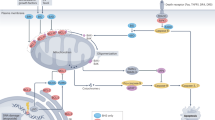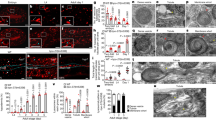Abstract
Caspase-3 is activated during both terminal differentiation and erythropoietin-starvation-induced apoptosis of human erythroid precursors. The transcription factor GATA-1, which performs an essential function in erythroid differentiation1,2 by positively regulating promoters of erythroid and anti-apoptotic genes3,4,5,6, is cleaved by caspases in erythroid precursors undergoing cell death upon erythropoietin starvation or engagement of the death receptor Fas7,8. In contrast, by an unknown mechanism, GATA-1 remains uncleaved when these cells undergo terminal differentiation upon stimulation with Epo9,10,11. Here we show that during differentiation, but not during apoptosis, the chaperone protein Hsp70 protects GATA-1 from caspase-mediated proteolysis. At the onset of caspase activation, Hsp70 co-localizes and interacts with GATA-1 in the nucleus of erythroid precursors undergoing terminal differentiation. In contrast, erythropoietin starvation induces the nuclear export of Hsp70 and the cleavage of GATA-1. In an in vitro assay, Hsp70 protects GATA-1 from caspase-3-mediated proteolysis through its peptide-binding domain. The use of RNA-mediated interference to decrease the Hsp70 content of erythroid precursors cultured in the presence of erythropoietin leads to GATA-1 cleavage, a decrease in haemoglobin content, downregulation of the expression of the anti-apoptotic protein Bcl-XL, and cell death by apoptosis. These effects are abrogated by the transduction of a caspase-resistant GATA-1 mutant. Thus, in erythroid precursors undergoing terminal differentiation, Hsp70 prevents active caspase-3 from cleaving GATA-1 and inducing apoptosis.
This is a preview of subscription content, access via your institution
Access options
Subscribe to this journal
Receive 51 print issues and online access
$199.00 per year
only $3.90 per issue
Buy this article
- Purchase on Springer Link
- Instant access to full article PDF
Prices may be subject to local taxes which are calculated during checkout




Similar content being viewed by others
References
Fujiwara, Y. et al. Arrested development of embryonic red cell precursors in mouse embryos lacking transcription factor GATA-1. Proc. Natl Acad. Sci. USA 93, 12355–12358 (1996)
Pevny, L. et al. Erythroid differentiation in chimaeric mice blocked by a targeted mutation in the gene for transcription factor GATA-1. Nature 349, 257–260 (1991)
Weiss, M. J., Keller, G. & Orkin, S. H. Novel insights into erythroid development revealed through in vitro differentiation of GATA-1 embryonic stem cells. Genes Dev. 8, 1184–1197 (1994)
Motoyama, N. et al. bcl-x prevents apoptotic cell death of both primitive and definitive erythrocytes at the end of maturation. J. Exp. Med. 189, 1691–1698 (1999)
Weiss, M. J. & Orkin, S. H. Transcription factor GATA-1 permits survival and maturation of erythroid precursors by preventing apoptosis. Proc. Natl Acad. Sci. USA 92, 9623–9627 (1995)
Gregory, T. et al. GATA-1 and erythropoietin cooperate to promote erythroid cell survival by regulating bcl-xL expression. Blood 94, 87–96 (1999)
Gregoli, P. A. & Bondurant, M. C. Function of caspases in regulating apoptosis caused by erythropoietin deprivation in erythroid progenitors. J. Cell. Physiol. 178, 133–143 (1999)
De Maria, R. et al. Negative regulation of erythropoiesis by caspase-mediated cleavage of GATA-1. Nature 401, 489–493 (1999)
Zermati, Y. et al. Caspase activation is required for terminal erythroid differentiation. J. Exp. Med. 193, 247–254 (2001)
Carlile, G. W., Smith, D. H. & Wiedmann, M. Caspase-3 has a nonapoptotic function in erythroid maturation. Blood 103, 4310–4316 (2004)
Kolbus, A. et al. Raf-1 antagonizes erythroid differentiation by restraining caspase activation. J. Exp. Med. 196, 1347–1353 (2002)
Shimizu, S., Narita, M. & Tsujimoto, Y. Bcl-2 family proteins regulate the release of apoptogenic cytochrome c by the mitochondrial channel VDAC. Nature 399, 483–487 (1999)
Adams, J. M. & Cory, S. The Bcl-2 protein family: arbiters of cell survival. Science 281, 1322–1326 (1998)
Garrido, C. et al. HSP27 and HSP70: potentially oncogenic apoptosis inhibitors. Cell Cycle 2, 579–584 (2003)
Bruey, J. M. et al. Hsp27 negatively regulates cell death by interacting with cytochrome c. Nature Cell Biol. 2, 645–652 (2000)
Beere, H. M. et al. Heat-shock protein 70 inhibits apoptosis by preventing recruitment of procaspase-9 to the Apaf-1 apoptosome. Nature Cell Biol. 2, 469–475 (2000)
Ravagnan, L. et al. Heat-shock protein 70 antagonizes apoptosis-inducing factor. Nature Cell Biol. 3, 839–843 (2001)
Jaattela, M. et al. Hsp70 exerts its anti-apoptotic function downstream of caspase-3-like proteases. EMBO J. 17, 6124–6134 (1998)
Winning, R. S. & Browder, L. W. Changes in heat shock protein synthesis and hsp70 gene transcription during erythropoiesis of Xenopus laevis. Dev. Biol. 128, 111–120 (1988)
Muta, K. et al. Stem cell factor retards differentiation of normal human erythroid progenitor cells while stimulating proliferation. Blood 86, 572–580 (1995)
Munugalavadla, V. et al. Repression of c-kit and its downstream substrates by GATA-1 inhibits cell proliferation during erythroid maturation. Mol. Cell. Biol. 25, 6747–6759 (2005)
Gregoli, P. A. & Bondurant, M. C. The roles of Bcl-XL and apopain in the control of erythropoiesis by erythropoietin. Blood 90, 630–640 (1997)
Saleh, A. et al. Negative regulation of the Apaf-1 apoptosome by Hsp70. Nature Cell Biol. 2, 476–483 (2000)
Zermati, Y. et al. Transforming growth factor inhibits erythropoiesis by blocking proliferation and accelerating differentiation of erythroid progenitors. Exp. Hematol. 28, 885–894 (2000)
Acknowledgements
We thank C. Pouzet for her assistance in confocal analysis, F. Valensi and V. Asnafi for their assistance in cytological analysis, Y. Dumez, A. Benachi and F. Audat for providing us with cord blood samples; U. Testa for the cDNAs of GATA-1 and poly(ADP-ribose) polymerase subcloned in PET21; and A. Benmerah for providing us with leptomycin B. This work was supported by grants from the Ligue nationale contre le cancer (LNC), the Fondation pour la recherche médicale (FRM), the Association pour la recherche sur le cancer (ARC), Cancéropole d’Île de France, Fondation de France, Ministère de la recherche and AMGEN.
Author information
Authors and Affiliations
Corresponding authors
Ethics declarations
Competing interests
Reprints and permissions information is available at www.nature.com/reprints. The authors declare no competing financial interests.
Supplementary information
Supplementary Information
The file contains a Supplementary Note on Hsp70 and Hsc70, a Supplementary Methods section describing all reagents used as well as detailed protocols, Supplementary Figures 1-8 with legends and a Supplementary References. (PDF 935 kb)
Rights and permissions
About this article
Cite this article
Ribeil, JA., Zermati, Y., Vandekerckhove, J. et al. Hsp70 regulates erythropoiesis by preventing caspase-3-mediated cleavage of GATA-1. Nature 445, 102–105 (2007). https://doi.org/10.1038/nature05378
Received:
Accepted:
Published:
Issue Date:
DOI: https://doi.org/10.1038/nature05378
This article is cited by
-
Role of Caspase-10-P13tBID axis in erythropoiesis regulation
Cell Death & Differentiation (2023)
-
How does caspases regulation play role in cell decisions? apoptosis and beyond
Molecular and Cellular Biochemistry (2023)
-
Cross-Adaptation: from F. Z. Meerson to the Present. Part 2. Mechanisms of Cross-Adaptation
Neuroscience and Behavioral Physiology (2023)
-
Common factors among three types of cells aged in mice
Biogerontology (2023)
-
High caspase 3 and vulnerability to dual BCL2 family inhibition define ETO2::GLIS2 pediatric leukemia
Leukemia (2023)
Comments
By submitting a comment you agree to abide by our Terms and Community Guidelines. If you find something abusive or that does not comply with our terms or guidelines please flag it as inappropriate.



